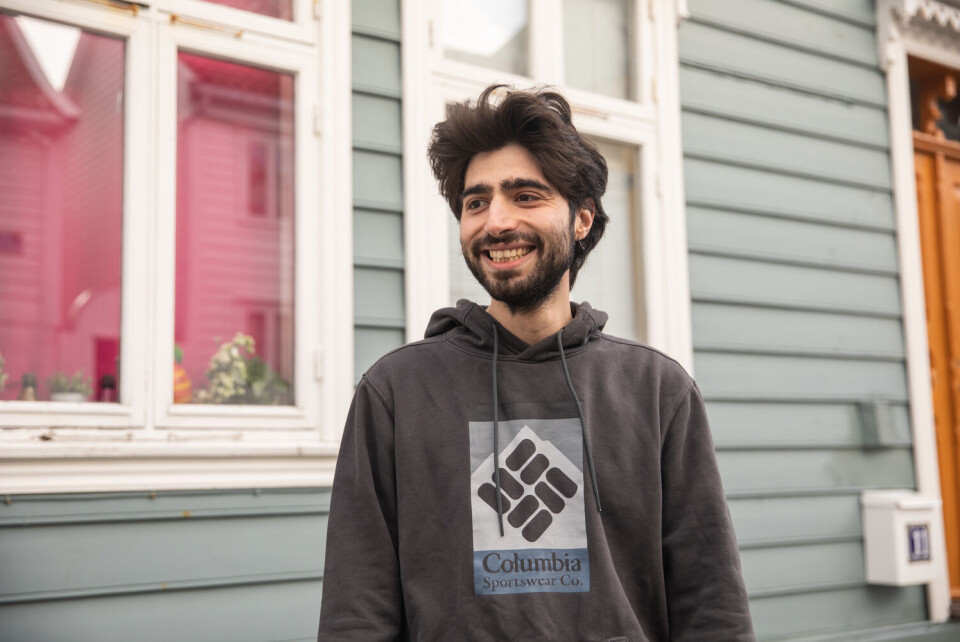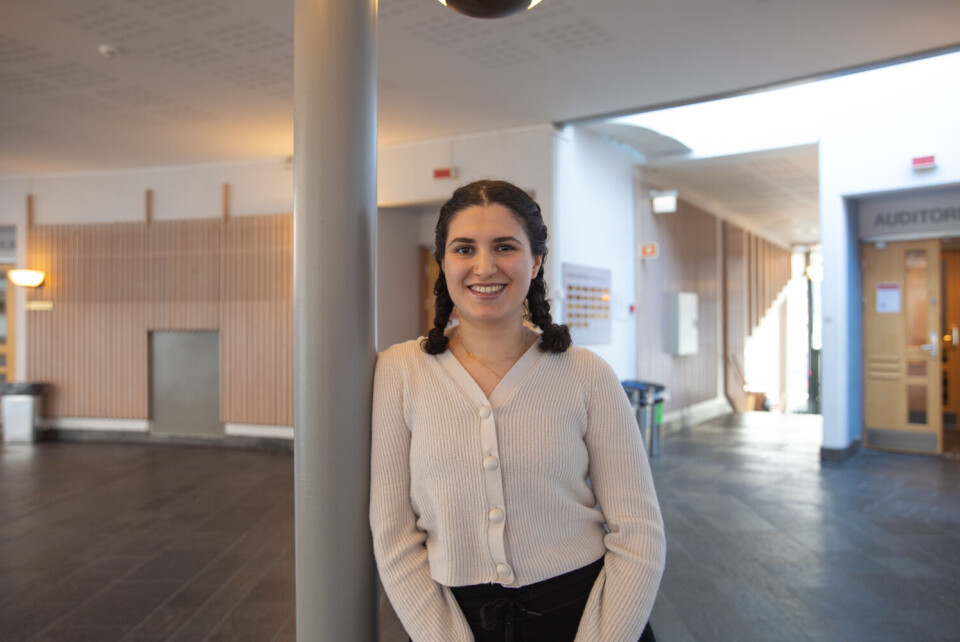English
Six international students on how they finance their studies
Augusto from Brazil has to work to afford his studies abroad, while Manal from Canada relies on her savings and scholarship.

Few countries around the world have Norway’s «Lånekassen» system, which gives Norwegian students a part-grant, part-loan of up to 220,000 NOK. And not everywhere is education free.
Bergen hosts a diverse group of foreign students from across the globe. They all have different approaches to financing education. We spoke to six of them on how they finance their studies and living in their home country and abroad.
Naana Okyerewah Dwamwna, Ghana (26). Master in public administration at the University of Bergen
How did you fund your education and living in your home country?
In Ghana it is common for people to go to university and it is quite affordable for everyone. Usually a semester fee of only around 1500 NOK has to be paid. Depending on your family’s salary, you can get a scholarship which is what makes studying affordable for many. Luckily, back home my parents would support me financially so I didn’t have to work as a student or apply for scholarships and could instead focus on my studies.

How do you fund your stay in Norway?
The semester fee in Norway is also quite low, but the cost of living here is certainly much higher than in Ghana. But I manage. I am grateful to my sisters, Anna, a chef, and Nana Amma, an administrator, who support me from Africa, without asking for anything. Still, I don’t want to burden my family too much, and since I didn’t get a scholarship to come to Norway, I decided to look for a job to at least cover the rent. My residence permit allows me to work part-time so now I work around 80 hours a month as a waitress and manage to support myself without any problems. In Ghana, it would be more difficult to reconcile work and study.
Pasquale Cuomo, Italy (23). Master in philosophy at the Sapienza University of Rome
How do you fund your education and living in your home country?
Like most Italian students I don’t work during my studies, because it is difficult to combine the two. But I find ways to fund my life without relying on my parents too much. There’s no such thing as «Lånekassen» in Italy, but you can get financial help if you’re a good student. For example, thanks to my high grades, I get a 30.000 NOK scholarship per year. It also allows me to get a semester fee waiver. The fee depends on the university and the salary of your parents, but it can be up to 20.000 NOK. Winning literary competitions has also provided me with some extra income to support my daily life.

How do you fund your stay in Norway?
I have three sources of money for my stay in Norway. First, I get a 5500 NOK Erasmus scholarship. Thanks to this scholarship I also don’t pay the semester fee here because it’s enough that I pay it at my home university. Second, I use the award money from the competitions I took part in. Lastly, I work as a volunteer at the student bar Ad Fontes, which allows me to save money because of the discounts I get for working there. But I’m still looking for a job to support my lifestyle here, because it’s just not quite enough.
Emilija Radlinskaitė, Lithuania (22). Bachelor in molecular biology at Vilnius University
How do you fund your education and living in your home country?
I don’t pay anything for university education in Lithuania, because, as a rule, it is free for most. If you had below average grades when you applied for university you might be required to pay for your studies. But if your grades improve during your studies the university can drop that requirement. Still, we don’t get paid to study. Most students have to hold either a summer job or a part-time job to cover their living expenses. Last year, for example, I worked in a lab testing COVID samples. My parents also pay for my dorm, which is only about 1000 NOK, so much less than in Norway. Around ten percent of the best students receive scholarships, but they’re usually small and not even enough to cover the cost of the dorm.

How do you fund your stay in Norway?
As an Erasmus student I get 5000 NOK per month. What’s interesting is that students going on an exchange to less expensive countries than Norway get a smaller sum. I guess I could survive on the scholarship alone. But the dorm itself eats up 3200 NOK and I don’t get too much help from my parents so I found a part-time online job which contributes to my budget. This helps a lot, especially if you want to travel around Norway and experience the country.
Read also: WTF… is going on with alcohol in Norway?
Manal Djerroud, Canada (23). Bachelor in civil law at the University of Montreal
How do you fund your education and living in your home country?
Education is not free in Canada, and because of that I have to pay around 30.000 NOK a year. But you’re not alone paying those fees. The government offers a lot of support. For example, if your parents income is low enough, you’re eligible for a government grant, regardless of your grade average. My parents were also able to save up a year’s worth of tuition fees through a special saving account where the government matches every deposit your parents make. Thanks to this I’ve never had to actually work to pay for my education and living. I’ve worked as a barista, legal intern and cashier, but just to cover personal expenses.

How do you fund your stay in Norway?
Through a combination of personal savings, scholarship, and some help from my parents. My university scholarship provides me with 22.000 NOK per semester, although I still have to pay the yearly tuition fee back home, and an organization from Quebec supporting youth exchanges reimbursed part of my plane ticket costs. Also, I managed to save up 48.000 NOK through working, and recently I got a pleasant surprise – almost 10.000 NOK in tax refunds. Overall I feel like my funds are enough – I get to travel and enjoy my stay here, instead of just subsisting.
Lai Martha Yee Chun, Hong Kong (20). Bachelor of Arts in creative media at the City University of Hong Kong
How do you fund your education and your living in your home country?
Back home I fund my life as a student by working as an intern at a publishing company in Hong Kong, trading stock, and with some help from my mother. University is not free, because you have to pay a 23,200 NOK semester fee. On the other hand, unlike in Norway where you need to buy expensive textbooks for classes, professors at my home university give us study materials provided by the university for free. This is a big help.

How do you fund your stay in Norway?
My funding scheme is more or less the same as at home. I still get support from my mother and I kept my job at the publishing company, which I can do remotely. But on top of that I also get financial support from the Student Exchange Fund which is provided by my home university. The textbooks in Norway are expensive, but at least I don’t have to pay a semester fee. I’ve also learned how to save money, for example by buying youth plane tickets and looking for other promotions.
Augusto Cesar, Brazil (26). Master in Earth Science at the University of Bergen
How do you fund your education and living in your home country?
In Brazil, I have a full-time job as an analyst, which covers my rent and living expenses. In addition, the state provides me with a pension following the death of my father, which boosts my finances. Universities in Brazil are free, so my savings and income allows me to fund my living without any major problems.

How do you fund your stay in Norway?
Norway is definitely more expensive than Brazil, and I didn’t get a scholarship to come and study here, so I had to find a job. At the moment I work in the restaurant business. It can be difficult to find a job in Norway if you don’t speak the language because your choices are limited. But employers here appreciate students with a lot of drive. And I have plenty of that, which makes it a lot easier to find one. It’s been worth it, because I’m financially secure now. Norway provides a lot of guarantees in terms of workers’ rights and the salary is a dream. Working conditions would never be that good in Brazil.
Read also: Essay: Facing the rain head-on
Read also: – It would be ideal if Mexico was like Norway
















